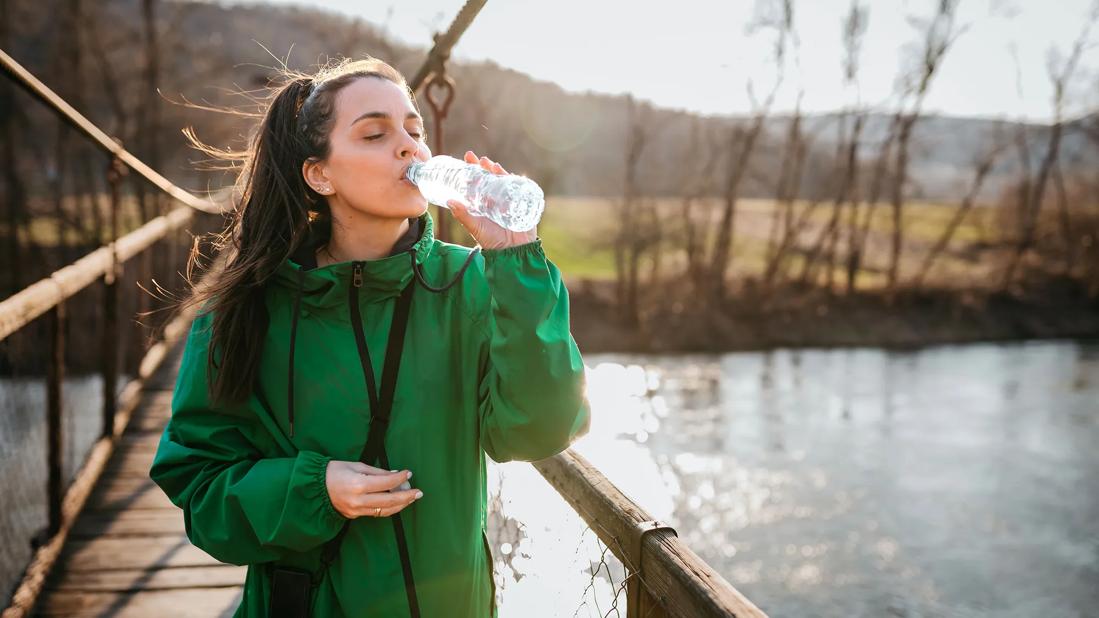Stay hydrated, eat a well-balanced diet and exercise regularly to keep these vital organs in good shape

Image content: This image is available to view online.
View image online (https://assets.clevelandclinic.org/transform/0af921f8-a591-49c3-9bb2-6c8e74aa1065/exercise-drink-water-1388805218)
Person drinking water while on a walk outside
High blood pressure, diabetes or a family history of kidney failure put 1 in 3 Americans at an increased risk of developing kidney disease.
Advertisement
Cleveland Clinic is a non-profit academic medical center. Advertising on our site helps support our mission. We do not endorse non-Cleveland Clinic products or services. Policy
But even if you don’t have any of those risk categories, it’s still important to take care of these critical organs that filter your blood.
Nephrologist James Simon, MD, explains how you can keep your kidneys healthy.
There are several things you can do to keep your kidneys as healthy as possible at every stage of life. Dr. Simon shares how to improve kidney health.
“Contrary to popular belief, studies haven’t proven overhydration as an effective practice in enhancing kidney function,” clarifies Dr. Simon.
So, while it’s always a good idea to drink enough water, drinking more than the typical four to six glasses a day probably won’t help your kidneys do their job any better.
Dr. Simon points out that most kidney problems arise out of other medical conditions like high blood pressure, diabetes and cardiovascular disease.
Because of this, he suggests you follow healthy eating habits to maintain a healthy weight and manage blood pressure, including cutting out excess salt. Preventing diabetes and high blood pressure can help keep kidneys in good condition.
Like eating a well-balanced diet, regular physical activity can help you maintain a healthy weight and stave off high blood pressure. But be mindful of how much exercise you do, especially if you’re not conditioned.
Advertisement
“Overexerting yourself when you’re not in good shape can lead to serious problems, especially if you are at high risk for heart disease,” Dr. Simon cautions.
If you’re at high risk for heart disease and don’t exercise but want to start, talk to a healthcare provider before beginning any new workout program.
When it comes to how to keep your kidneys healthy, you may think adding a supplement or herbal remedy is the way to go. But not so fast, says Dr. Simon.
Excessive amounts of certain vitamin supplements and some herbal extracts may be harmful to your kidneys. Dr Simon advises talking to a healthcare provider about any vitamin supplements you plan to take.
Smoking can damage blood vessels, which decreases the flow of blood in your kidneys. When your kidneys don’t have adequate blood flow, they can’t function at optimal levels. Smoking also increases the risk of high blood pressure, as well as the risk of kidney, ureter and bladder cancer.
While vaping may not expose someone to many of the toxins in tobacco smoke, the nicotine is still very addictive and hard on the body, Dr. Simon states. Plus, there are many chemicals in the vaping solutions.
“Common nonprescription pills like ibuprofen and naproxen (NSAIDs) can cause kidney damage if taken too regularly over a prolonged period,” Dr. Simon warns.
If you have healthy kidneys and use these medicines for occasional pain, they probably don’t pose a risk. But he says that if you take them for chronic pain or arthritis, you should talk to your doctor about monitoring your kidney function or finding alternative ways to manage your pain.
“If you have diabetes, high blood pressure or cardiovascular disease, your doctor should screen for kidney dysfunction as part of routine care for those conditions,” Dr. Simon recommends.
A kidney function test (typically a blood test) measures how well your kidneys are working.
When you’re thinking about how to keep your kidneys healthy, the most important thing you can do is to take care of your body to help reduce your chances of developing diseases that put a strain on your kidneys.
“Eat healthily, exercise regularly and control your weight,” Dr. Simon reiterates. “These healthy practices are not new and not necessarily specific to kidney health. But healthy kidneys like a healthy body.”
Advertisement

Sign up for our Health Essentials emails for expert guidance on nutrition, fitness, sleep, skin care and more.
Learn more about our editorial process.
Advertisement
The supplement is OK for most people and may offer some potential benefits for kidney health
You can live a long, healthy life with one kidney — but protecting your kidney health is key
A renal diet is designed to cut out sodium, phosphorus and potassium
Learn which drugs and supplements can damage your kidneys
Rest, hydration, protein and light exercise all play an important role in your healing
A kidney specialist breaks down this problematic relationship
What's good for one is good for the other
Too much protein can be taxing on the kidneys
Although it could be used as a moisturizer, this new trend is not recommended
Communicating clear limits helps protect your time, energy and emotional well-being
High cholesterol can be genetic, but testing and treatment can lower your heart disease risk